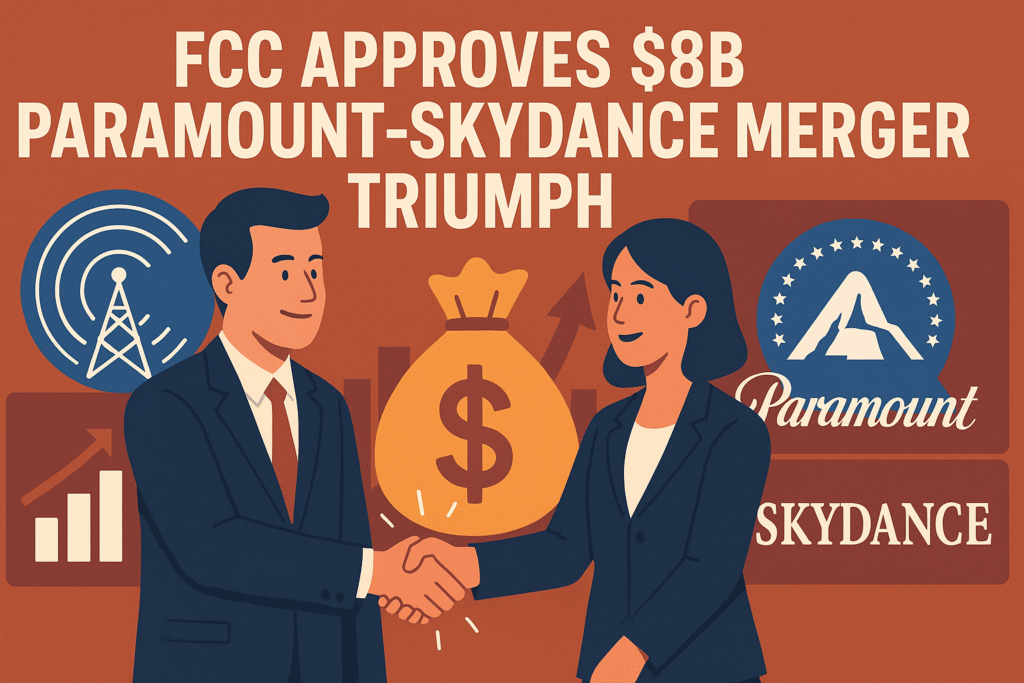Skydance Merger Triumph: Paramount’s Bold $8B Deal Approved Amid Political Firestorm
In a landmark move that signals a new era for Hollywood and media regulation, federal regulators have officially approved the $8 billion merger between Paramount Global and Skydance Media. This Skydance Merger Triumph comes after months of high-stakes drama, political wrangling, and media speculation, culminating in a Federal Communications Commission (FCC) vote that paves the way for the creation of a revitalized media powerhouse.
The Skydance Merger Triumph marks a turning point not just for Paramount and Skydance, but for the broader media landscape grappling with political influence, corporate governance, and the evolving dynamics of news and entertainment in the digital age.
The Path to Approval
The merger, valued at $28 billion when including other financial arrangements, unites Paramount’s storied legacy with Skydance’s tech-forward ambition. The Ellison family, founders of Skydance and backed by RedBird Capital, committed $8 billion to finalize the merger. Despite numerous delays and regulatory challenges, the FCC approved the deal in a 2-1 vote, granting the green light that both companies had been anxiously awaiting.
FCC Chairman Brendan Carr, who led the approval process, praised the merger as an opportunity to restore balance to CBS, Paramount’s flagship network. “Americans no longer trust the legacy national news media to report fully, accurately, and fairly. It is time for a change,” Carr said.
While Carr supported the deal, FCC Commissioner Anna Gomez, appointed by former President Biden, dissented strongly. “After months of cowardly capitulation to this administration, Paramount finally got what it wanted,” she stated, warning that the American public may ultimately bear the cost of this deal.
Political Intrigue: Trump, CBS, and “60 Minutes”
The Skydance Merger Triumph did not unfold in a vacuum. It occurred amid intense scrutiny surrounding Paramount’s legal entanglements with President Donald Trump, who sued CBS over the editing of a “60 Minutes” interview with Vice President Kamala Harris during the previous election cycle. Trump initially sought $10 billion in damages, later increasing the demand to $20 billion.
The network defended its editorial integrity, noting that editing for brevity is standard journalistic practice. However, the lawsuit cast a long shadow over the merger process. Ultimately, Paramount reached a controversial $16 million settlement with Trump, earmarked for his legal fees and future presidential library. The settlement ignited a political firestorm, with critics alleging it was a thinly veiled bribe to appease Trump and ensure regulatory approval of the Skydance Merger Triumph.
Senator Elizabeth Warren labeled the settlement “bribery in plain sight,” demanding an investigation and stricter rules regarding donations to presidential libraries.
Fallout at CBS and Paramount
The ramifications of the Skydance Merger Triumph reverberated through CBS News. Shortly after the settlement was announced, CBS canceled Stephen Colbert’s “Late Show,” citing financial reasons. This move raised eyebrows, particularly since Colbert had criticized the settlement on air just days before. Meanwhile, former “60 Minutes” executive producer Bill Owens resigned, saying he was no longer allowed to run the show as he had in the past.
Wendy McMahon, CEO of CBS News, also resigned, reportedly due to disagreements about the network’s future direction. These internal upheavals underscore the profound changes that the Skydance Merger Triumph is likely to bring to CBS’s editorial and operational landscape.
Promises of Reform and Innovation
To reassure regulators and the public, Skydance has promised significant reforms. The company plans to install an ombudsman to review claims of media bias at CBS News and conduct a comprehensive review of editorial standards. In filings submitted to the FCC, Skydance pledged to support “a diversity of viewpoints across the political and ideological spectrum.”
David Ellison, the future CEO of the merged company and son of Oracle co-founder Larry Ellison, aims to transform Paramount into a “tech hybrid” fit for modern audiences. Central to this vision is a complete overhaul of Paramount+ and expanded direct-to-consumer strategies. The Skydance Merger Triumph is seen as a strategic pivot, allowing the company to stay competitive in an increasingly fragmented and fast-paced entertainment industry.
The Road Ahead
The Skydance Merger Triumph is expected to be finalized by September, although some analysts believe it could close sooner. With the regulatory barriers now cleared, the focus will shift to integration and execution.
Key questions remain about how Skydance will navigate Paramount’s deep-rooted legacy culture, especially in its news division. The appointment of Tanya Simon as the new top producer of “60 Minutes” is seen as a move to stabilize leadership and restore internal trust. However, ongoing scrutiny from journalists, lawmakers, and media watchdogs means the merged company will have to tread carefully.
The Skydance Merger Triumph also raises broader concerns about the role of politics in media regulation. With the Trump lawsuit and settlement looming large, critics argue that corporate independence and journalistic integrity have been compromised in favor of commercial and political expediency.
Conclusion
Despite the turbulence, the Skydance Merger Triumph represents a bold gamble on the future of media. By merging Paramount’s iconic brand with Skydance’s tech-driven innovation, the companies aim to create a modern entertainment juggernaut capable of competing in an era dominated by streaming and short-form content.
Whether this merger revitalizes CBS and strengthens Paramount’s competitive position or accelerates the erosion of editorial independence will depend on the leadership choices made in the coming months. For now, the deal stands as a defining moment—a Skydance Merger Triumph fueled by ambition, controversy, and the unrelenting pace of change in today’s media world.
